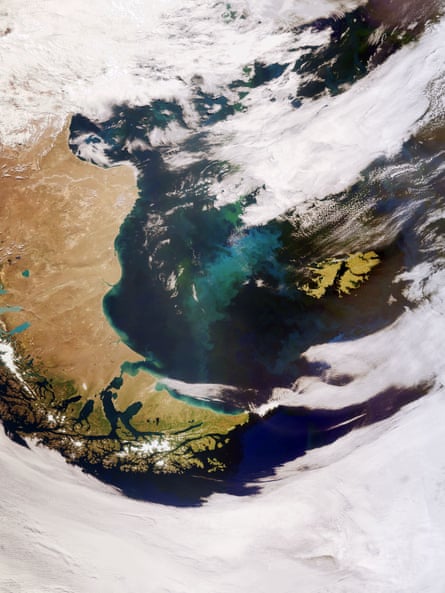‘Taking the pulse of the planet’: how monitoring nature from discipline could maybe maybe maybe preserve Earth healthy – Guardian
For the handful of parents that get the chance to glimpse Earth from discipline, the influence is in general profound. Known as the “overview enact”, astronauts document being deeply moved by the journey, because the planet’s fragility and elegance grew to turn out to be obvious. Others, such because the actor William Shatner, said they were overcome with ache.
Now, scientists are proposing the creation of a original machine that they hope will exercise the stare from discipline to transform our notion of Earth’s changing ecology and its complicated programs.
By combining satellite records and imagery with on-the-floor applied sciences equivalent to digicam traps, acoustic monitoring and DNA barcoding in every country on Earth, scientists say the creation of a original multibillion world plan would enable countries to effectively note the neatly being of the planet and safeguard food, water and area materials supplies for billions of parents.
In 2022, governments pledged to transform their relationship with nature by the cease of the last decade. From halting extinctions triggered by human behaviour to restoring nearly a Third of the planet’s degraded ecosystems, countries signed as much as 23 targets to cease the immediate decline of life on Earth.
Nonetheless a rising need of scientists warn that records about the neatly being of the planet’s seas, soils, forests and species are so unsuitable, it could maybe maybe maybe maybe be no longer probably to perceive if we were winning at meeting the agreed-upon targets. Regardless of indispensable advances in monitoring the climate, records on the Earth’s biodiversity is barely wretched, they say. To conquer the distress, researchers fill proposed the creation of a original machine to note the biosphere linked to how folks note the climate, gradually “taking the pulse of the planet”.

Canada, Colombia and a lot of alternative European worldwide locations are amongst the countries constructing their have biodiversity observation networks – identified as BONs – which researchers say must always tranquil be blended right into a world observation machine. A BON machine brings collectively raw records on seas, soils, forests and species to present an overview of a nation’s biodiversity neatly being – which can maybe maybe maybe then be blended at a planetary stage.
“The uncertainty in our records of where biodiversity is changing is so immense that even if we enact the targets, we wouldn’t be in a contrivance to measure them,” says Andrew Gonzalez, a professor in conservation biology at the College of McGill, who co-chairs GEO BON, a world biodiversity observation community aiming to get the initiative a fact.
“We wouldn’t even know if we’d hit the aim. I’m no longer particular that all americans’s rather ready for that conclusion nonetheless that’s the stark fact,” he says. “If you must maybe’t measure it, you must maybe’t region up it, because the pronouncing goes. And whereas you must maybe’t predict it, you must maybe’t shield it. These items in fact topic.”
This year, the area’s discipline agencies are coming collectively to toughen their biodiversity monitoring. There are hundreds obstacles of the present records, say researchers. Analysis of 742m records of nearly 375,000 species in 2021 stumbled on frequent gaps and biases: factual 6.74% of the planet has been sampled, with excessive elevations and deep seas in particular unknown. About a of essentially the most attention-grabbing gaps were within the tropics, despite these areas being dwelling to astronomical swathes of life. Europe, the US, Australia and South Africa accounted for 82% of all records, and more than half of of records centered on lower than 2% of identified species.
The records gaps are no longer restricted to animals. In 2023, Kew Gardens identified 32 planet “darkish spots” – collectively with Fiji, Unique Guinea and Madagascar – which can maybe maybe maybe be identified to be rich in plant biodiversity nonetheless fill wretched records records. Fourteen darkish spots were within the Asia-tropical put, six were within the Asia-temperate put, nine in South The US and two in Africa. There changed into once one in North The US.
Alice Hughes, an accomplice professor at the College of Hong Kong, says the wretched records protection manner that places savor the Democratic Republic of the Congo, which has the ideal share of the 2nd-most attention-grabbing rainforest on Earth – dwelling to colossal numbers of species – are poorly understood despite being below critical chance. Geospatial records could maybe also be earlier to note loss from spaces, says Hughes, nonetheless original applied sciences equivalent to eDNA and other programs fill unfolded original ways to note ecosystem neatly being.
Other programs, equivalent to acoustic monitoring and DNA barcoding enable better notion of ecosystems and name a pair of of the hundreds of hundreds of species but to be stumbled on. Innovations in scanning applied sciences enable researchers to envision a entire woodland for disease and name species distributions. Nonetheless scientists say there could be tranquil more to be carried out to stare at Earth’s programs as a entire.
“If you glide to a doctor, you don’t need them to factual stare at you and say, ‘yeah, you stare healthy’ or, ‘you stare a bit faded’,” says Hughes. “They lift measurements. There are hundreds completely other ways to exercise this records nonetheless it would on the entire enable us to lift the pulse of the planet.”
Maria Azeredo de Dornelas, a professor of biology at the College of St Andrews, says: “We need an even bigger observation machine that enables us to measure biodiversity savor we measure the climate. We doubtlessly don’t need it as in fact because the climate nonetheless we enact must enact it.
“There could be the ability to enact this in fact neatly. It would want world cooperation because it’s no longer the more or much less thing that one country and even continent can enact. The planet’s biodiversity doesn’t in fact care about political borders.”



